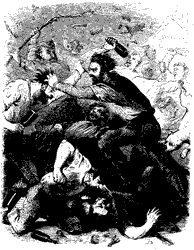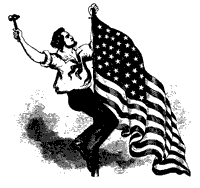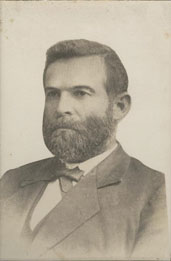By Dean Barber
It is a story that is largely unknown. Certainly it is not taught in the schools. It is a story of courage, conviction, patriotism, persecution, retribution, and even atrocity. Above all, it is a great American history story worth telling and preserving .
 When the gathering dark clouds of war were all encompassing in the South and in Northwest Alabama in particular in the spring of 1861, the voices of dissent were loud and clear. While some were eager to fight for a newly created secessionist government, many others considered an impeding war as a wicked, treasonous undertaking and wanted no part of it.
When the gathering dark clouds of war were all encompassing in the South and in Northwest Alabama in particular in the spring of 1861, the voices of dissent were loud and clear. While some were eager to fight for a newly created secessionist government, many others considered an impeding war as a wicked, treasonous undertaking and wanted no part of it.
Indeed, a majority in the hills of Northwest Alabama, mostly poor yeomen dirt farmers, saw little value or reason in taking arms against the federal government. They recognized quite early that this was not their fight, but that it was the landed gentry. It was obvious to the hill folk that the plantation owners and their political spokesmen were fanning the war flames and talked the loudest about separation.
With their money and property and political power, it was the planters who felt most threatened by the election of Abraham Lincoln as president.
That “Black Republican” Lincoln, the planters said, would mongrelize the races. He would destroy everything they built as a finer civilization. Southern women would not be safe from roving gangs of black thieves. They only thing to do, the planters contended, was to fight protect their very way of life, to secede and create a government that would protect their interests, protect their property rights, and protect that “peculiar institution.”
Of course, the peculiar institution was slavery.
But in the rugged landscape of northern Alabama, slaves were few and far between. The same was true in the mountains of East Tennessee and North Georgia and western North Carolina, and western Virginia, which would later become a state because of its overwhelming anti-confederate sentiment.
Few slaves were owned in the upland South, simply because the land would not support a plantation economy. Those who did work the land in the mountain South were a fiercely independent breed, poor but proud, and of no mind to lend support to plantation owners who looked down upon them as uneducated and inferior.
Winston County resident James B. Bell, a farmer who owned no slaves, was typical of an Alabama unionist. He blamed secession on large "Negroholders." In a letter to his pro-confederate son in Mississippi on April 21, 1861, he wrote. "All they [slave holders] want is to git you pupt up and go fight for there infurnal negroes and after you do there fighting you may kiss there hine parts for o [all] they care."
Southern unionists were not threatened by Lincoln’s election but saw him more as a blank slate. They were willing to give him a chance as president and did not see the federal government as any threat to their property rights.
The Loyalty to Old Hickory
If the inhabitants of the upland South were willing to give a new president the benefit of the doubt, they revered a former president. This was a man who lead their fathers and grandfathers against wild Indians and who tamed the land. He made their very existence here possible. President Andrew Jackson, “Old Hickory” was seen as a man of the people. He was also a staunch unionist who warned the Southern aristocracy years before that any talk of busting up the union was madness and any actions to do so would be punished severely.
At a time when the country was about to go war, many Alabama unionists spoke about how President Jackson would have dealt with secession by hanging the ringleaders and crushing the rebellion before it got started.
Indeed, Jackson warned South Carolina on Dec. 10, 1832 that he was prepared to do just that.
“Are you really ready to incur its guilt? If you are, on the heads of the instigators of the act be the dreadful consequences; on their heads be the dishonor, but on yours may fall the punishment. On your unhappy State will inevitably fall the evils of the conflict you force upon the Government of your country. It can not accede to the mad project of disunion, of which you would be the first victims.”
 And many Alabama unionists would remember the parting words of their fathers and grandfathers who served with Jackson, and who sensed years before that a war over secession could erupt. The old veterans would warn on their deathbeds to be loyal to the “Old Flag.” And their words were remembered and taken to heart.
And many Alabama unionists would remember the parting words of their fathers and grandfathers who served with Jackson, and who sensed years before that a war over secession could erupt. The old veterans would warn on their deathbeds to be loyal to the “Old Flag.” And their words were remembered and taken to heart.
So strong was union sentiment in North Alabama and East Tennessee that it was proposed that North Alabama join with unionist East Tennessee to form the loyal state of Nickajack.
The people of Winston County, Alabama, hill farmers of modest means, were typical of southern unionists. In 1860, Winston County was the poorest county in Alabama. The per capita value of property was $168 and the county ranked last in cotton production and slaveholding, with only 2 percent of the families owning slaves.
They were largely an isolated mountain people who had little influence on state government. They knew full well that the aristocracy viewed them as socially inferior and saw the impending conflict as “a rich man’s war and a poor man’s fight.”
It would eventually come to that but only after the southern unionists proclaimed their neutrality. For the most part, the hill people wanted to be left alone, to sit the war out.
But the authorities in Montgomery would have none of it. Montgomery took a dim view to these unionists when they flocked to the riverside to profess their support to arriving gunboats on the Tennessee River in Florence and Decatur. Shortly thereafter, Gov. John Gill Shorter warned that if requisitions made upon the state for volunteers were not duly met by the hill people, then a draft would be ordered on the delinquent counties.
“…in case a draft should be ordered, the Western portion of Walker – And the whole of Winston County will be among the first included, as it is notorious that they have not furnished anything like their proportion of volunteers,” the governor wrote.
The Meeting at Looney's Tavern
The leaders of Winston County responded by calling a meeting at Looney’s Tavern in the eastern portion of the county. An estimated 2,500 people attended from Winston, Walker, Lawrence, Blount, Marshall, Marion, Franklin and Fayette counties. Several resolutions were passed as a result of that meeting.
 |
The first resolution commended Chris Sheats, a schoolteacher from Winston County who was Winston County’s delegate to the Secession Convention. Sheats was one of 46 delegates who refused to change his vote against secession. (The first vote was 54 in favor of secession, 46 against.) He was jailed in an effort to change his vote, which he never did. Eventually, the Confederates would send him home with stern warnings to behave himself, which he never did.
The second resolution passed at Looney’s Tavern created the legend of “The Free State of Winston.” It read:
“We agree with Jackson that no state can legally get out of the Union; but if we are mistaken in this, and a state can lawfully and legally secede or withdraw, being only a part of the Union, then a county, any county, being a part of the state, by the same process of reasoning, could cease to be a part of the state.”
The third resolution passed at Looney’s tavern was a plea for neutrality.
|
| Chris Sheats |
“We think that our neighbors in the South made a mistake when they bolted, resulting in the election of Mr. Lincoln, and that they made a great mistake when they attempted to secede and set up a new government. However, we do not desire to see our neighbors in the South mistreated, and therefore, we are not going to take up arms against them; but on the other hand, we are not going to shoot at the flag of our fathers, “Old Glory,” the Flag of Washington, Jefferson and Jackson. Therefore, we ask that the Confederacy on the one hand and the Union on the other, leave us alone, unmolested, that we may work out our political and financial destiny here in the hills and mountains of northwest Alabama.”
Had the authorities in Montgomery been wise, they would have treated these Alabama unionists with kid gloves. Instead, they were branded as traitors or tories and a systematic campaign of persecution was launched by the Confederate home guard. Ironically, it was that harsh treatment that pushed many Alabama unionists into the federal camp to take arms against the Confederacy.
Conscription and Consequences
When the Confederate Congress passed the Conscription Act on April 16, 1862 requiring every able-bodied man between the ages of 18 and 35 to be subject to military service, the hill people found themselves in a quandary. Unwilling to fight for the Confederacy and unable to remain neutral, many took to the hills and caves and caverns to hide from conscription patrols. These unionist evaders along with Confederate deserters hiding in the hills became known as “mossbacks.”
Many of the unionists tried to hide their political views in order not to draw attention to themselves. It worked to a point.
“It was firmly in my mind that I would never go back on “Old Glory,” wrote Marion County resident John Phillips after the war. “I had heard too much from my old grandparents about the sufferings and privations they had to endure during the Revolutionary War to ever engage against the Stars and Stripes. However, I went slow and talked but little and thought by not talking either for or against it and giving them all they asked for and treating them kindly, they would let me alone.”
Eventually, John Phillips would be found out and the Home Guard would come calling.
“They commenced robbing my family of the support I had left for them, they drove off my cattle and took my horses and mules, also my corn. They event went so far as to pour what meal my family had out in the floor and fill the sacks with meat. They event took their cups, saucers and plates, not leaving anything for their sustenance.”
The severe treatment to his family by the Home Guard pushed John Phillips to making his way to federal lines and joining the 1st Alabama Cavalry, United States Volunteers.
“We all enlisted in the U.S. Army without any medical examination as we all wanted to enlist. I told them the Rebs had conscripted me and would claim me as a deserter and I never would suffer myself to be captured by them alive. The head officer said he would appoint me the Co. Sergt. And that would relieve me from guard duty, and place me in a position that would shield me from the chance of being captured as much as possible.”
Murder or political assassination was a constant threat for Alabama unionists who chose to remain at home. Three sons of Solomon Curtis were all killed in Winston County. Joel Jackson Curtis was killed in 1862 for refusing to join the confederate army. George Washington Curtis, home on leave from the union army, was killed by the home guard in his yard while his wife and three children watched. Thomas Pink Curtis, the probate judge of Winston County, was arrested near Houston by confederate authorities in 1864 and taken to a bluff on Clear Creek where he was summarily executed with two shots to his right eye.
Henry Tucker, a private in Company B, of the 1st Alabama Cavalry, US, was arrested by the Home Guard at his home in Marion County and tortured to death. He was tied to a tree, castrated, his eyes removed and his tongue cut out before he was literally skinned alive. He is buried at Hopewell Cemetery, south of Glen Allen, Ala.
But Tucker’s vicious death was avenged. Home Guard leader Stoke Roberts who personally directed the torture of Tucker, was eventually caught by a group of unionists near Winfield. They took a long iron spike and drove it through his mouth and out the back of his head and nailed him to the root of a big oak tree.
Unionists Organize to Fight
Understandably, many of those hiding in the hills looked forward to a federal invasion. In July 1862, unionists began arriving in small groups into the camp of the 51st Indiana Regiment in Decatur. The regiment’s commander, Col. Abel D. Streight was moved by these “brave mountaineers” who requested protection and a chance to fight the Confederacy.
“Never did people stand in greater need of protection. They have battled manfully against the most unscrupulous foe that civilized warfare has ever witnessed. They have been shut off from all communication with anybody but their enemies for a year and a half, and yet they stand firm and true. If such is not to be rewarded, if such citizens are not to receive protection, then their case is deplorable indeed.”
On the night of July 14,1862, Streight, who was intent on organizing the Alabamians into a fighting force, spoke to a gathering of unionists before introducing Chris Sheats to them.
Sheats apparently gave a stem-winder of a speech, telling his fellow Alabamians that the time had come join the army of the United States and fight the Confederacy “to hell and back again.”
“Tomorrow morning I am going to the Union army…I have slept in mountains, in caves and caverns, till I am become musty; my health and manhood are failing me, I will stay here no longer till I am enabled to dwell in quiet at home.”
Apparently the appeals to their patriotism succeeded, 150 men signed up in less than three days.
It is unclear how many Alabamians wore blue, because many, after secreting themselves to federal lines, simply joined other state regiments. Perhaps as many as 5,000 served in federal units. We do know that about 400 joined the Streight’s 51st Indiana in July 1862. We know that Alabama unionists served in 4th Ind. Cav.; the 12th Tenn. Cav; the 7th Ill Cav.; the 1st Middle Tenn Cav.; the 10th Mo Cav.; the 5th Tenn Cav.; the 14th Mich. Inf.; the 41st NY Inf.; the 56th Ill Inf. and the 11th Wis Inf.
More than 2,000 served in the 1st Alabama Cavalry, 239 from Winston County alone.
In his book Lincoln’s Loyalists, Richard Nelson Current estimated that 100,000 white southerners served in the federal army in contrast to 850,000-900,000 confederates. That means about one out of 10 southerners wore blue rather than gray. If you add the 185,000 blacks who fought in the union army, and most of them were southern including 10,000 from Alabama, it is apparent that the war was not between North and South but rather as Colonel Oates called it, “The War Between the Union and the Confederacy.”
P.D. Hall, a Marion-Franklin County resident, joined the 1st Alabama Cavalry and suggested that the Alabama unionists who fought “made a greater sacrifice for the Union than the men of the North.”
“Consider the loyal men in the South, especially as far south as Alabama, what they had to endure for their country. They were exposed and in danger every minute of their lives. They were shot sitting by their firesides or walking on the road; they had to leave their families to the abuse of the enemy; had to keep themselves closely concealed like the vermin in the woods until they could make escape through the lines, and then had to share the same hardships of soldiers life that the comrades of the North bore.”